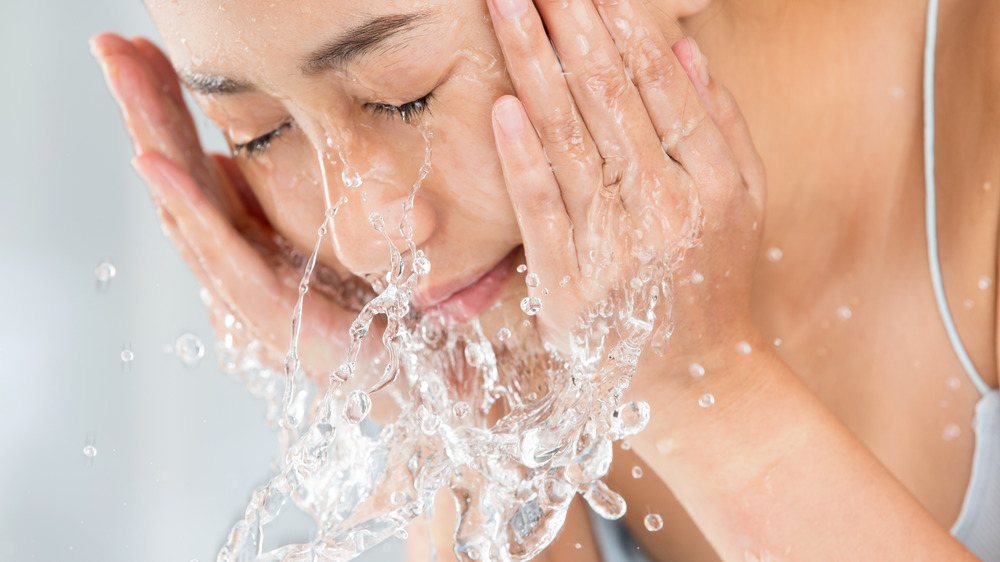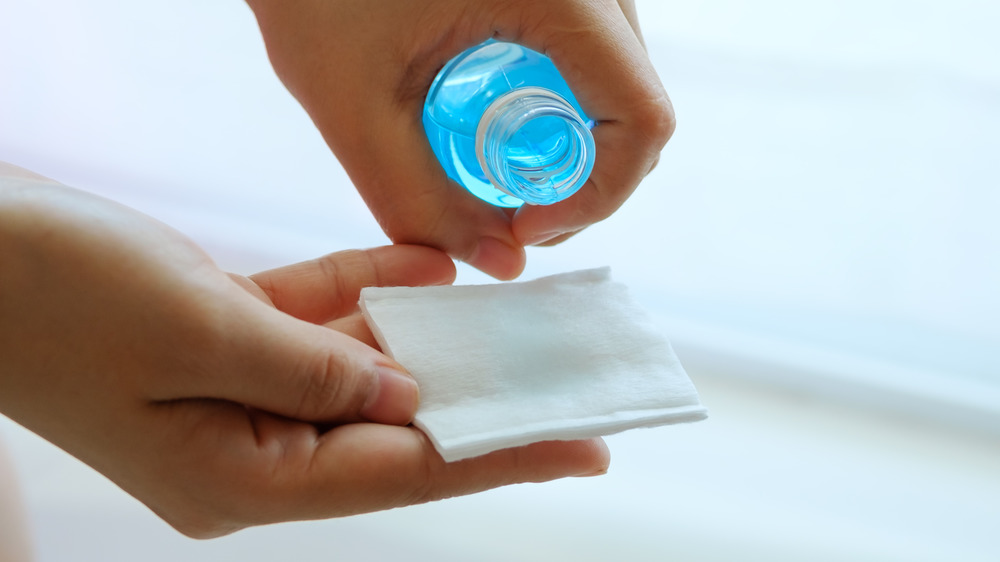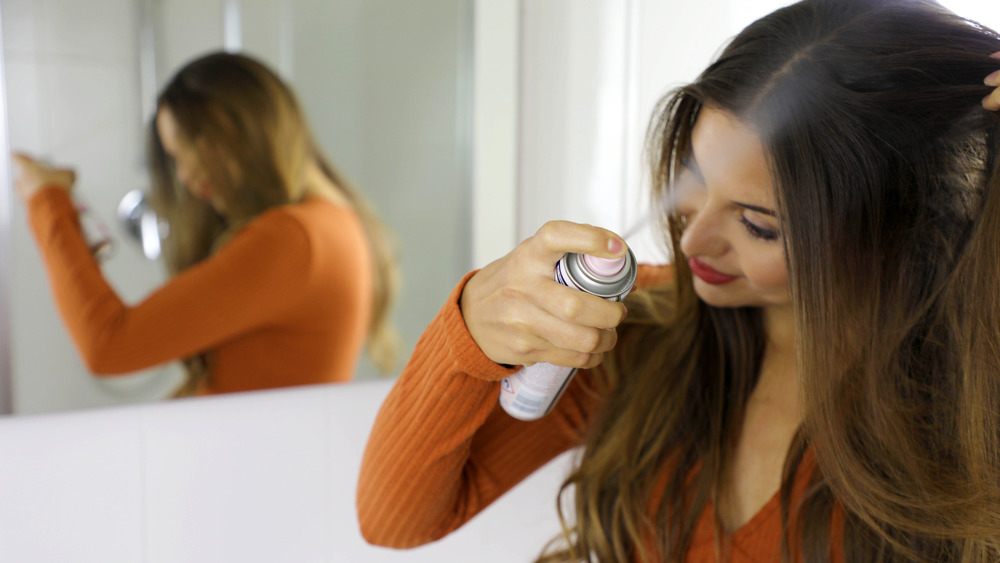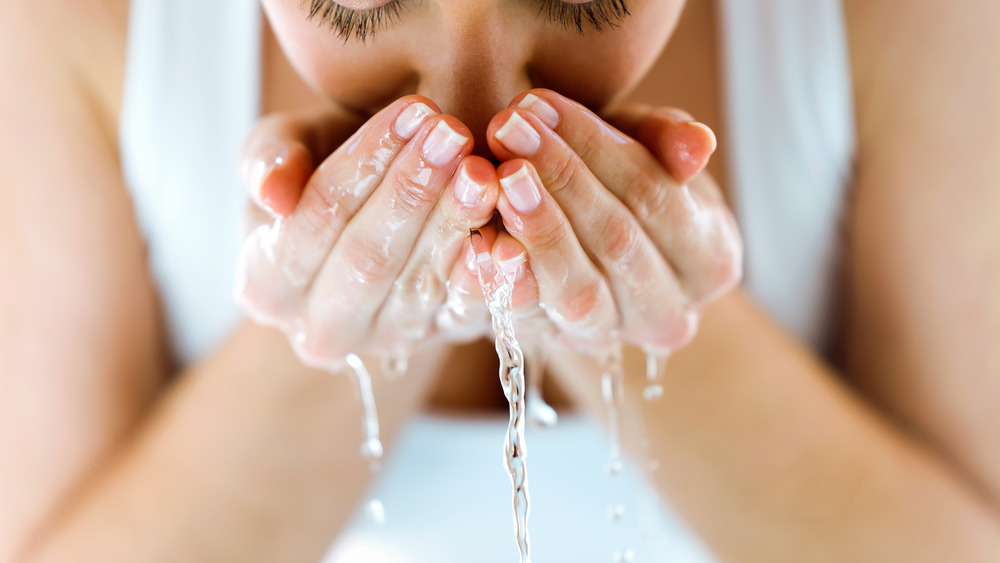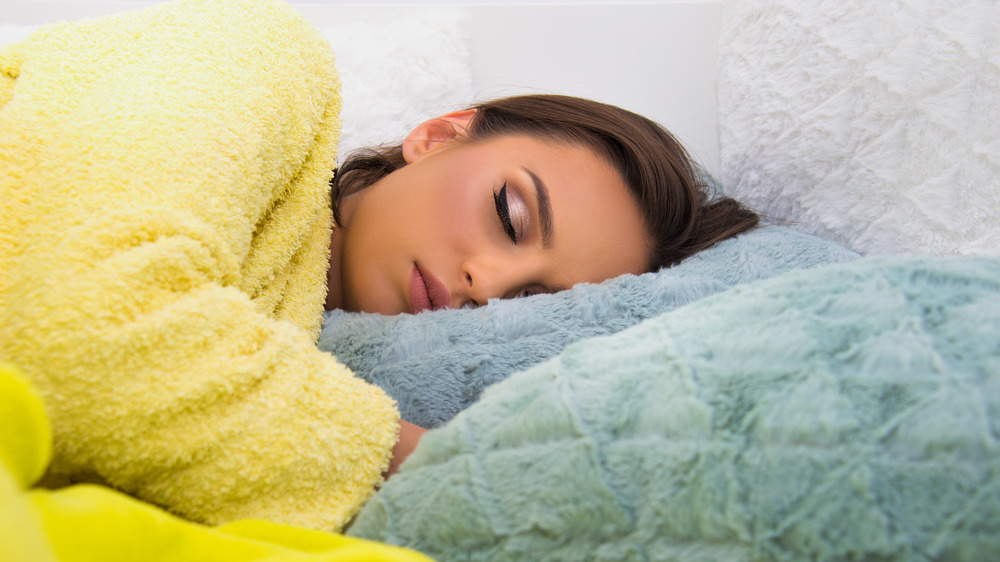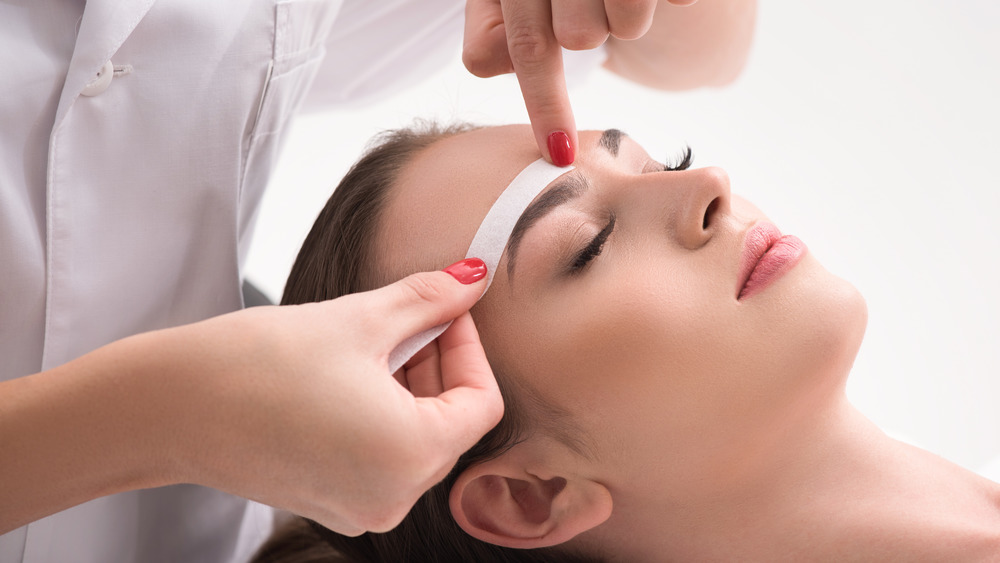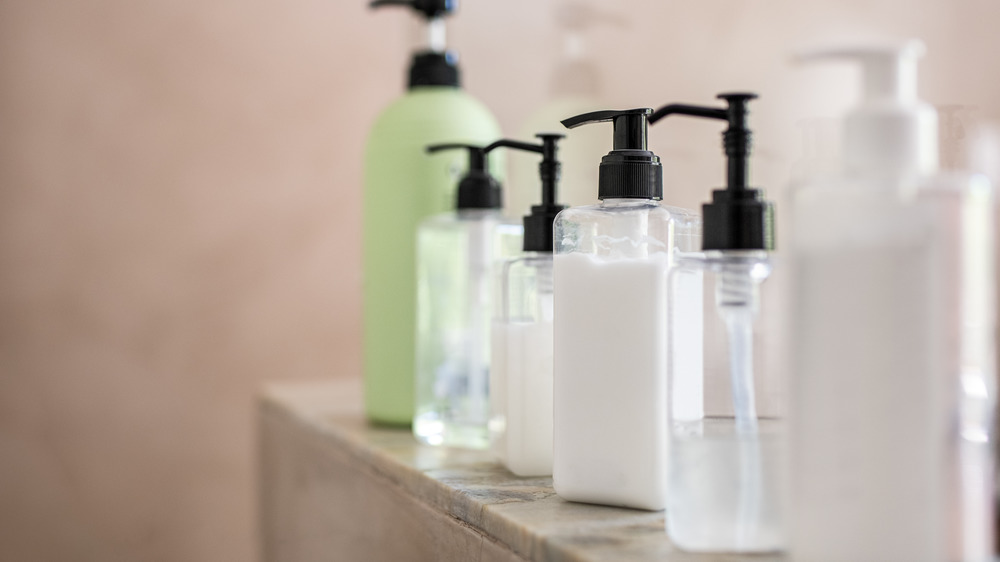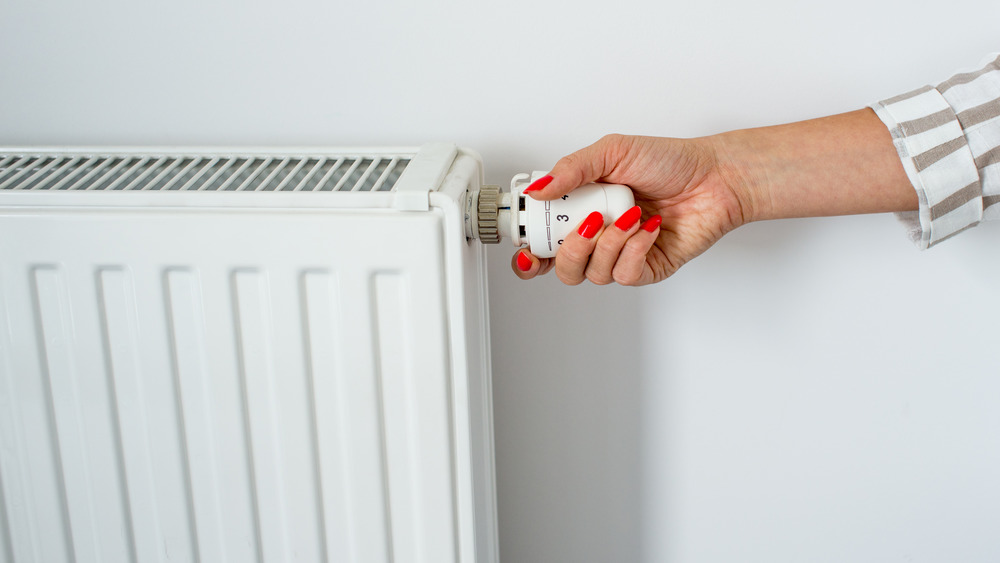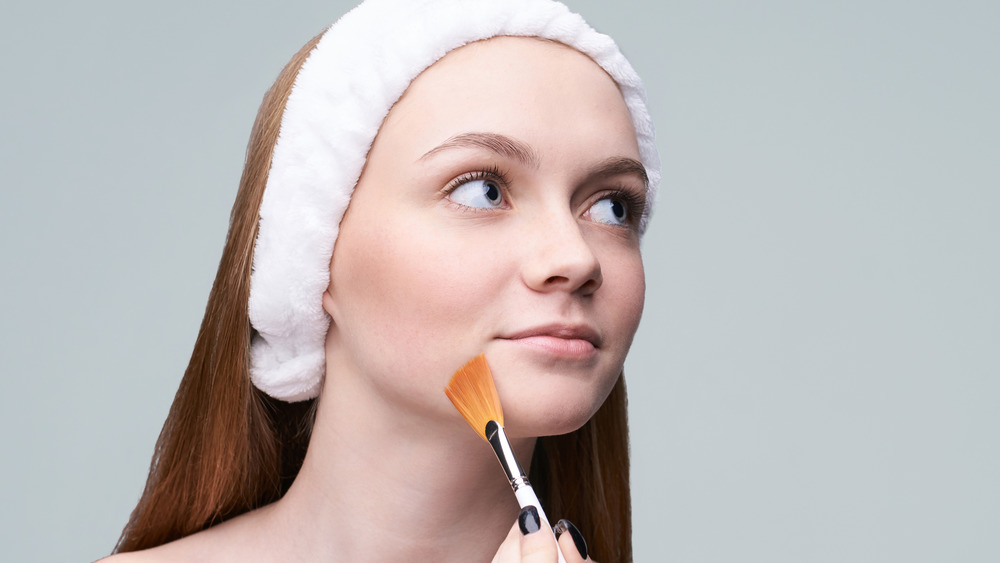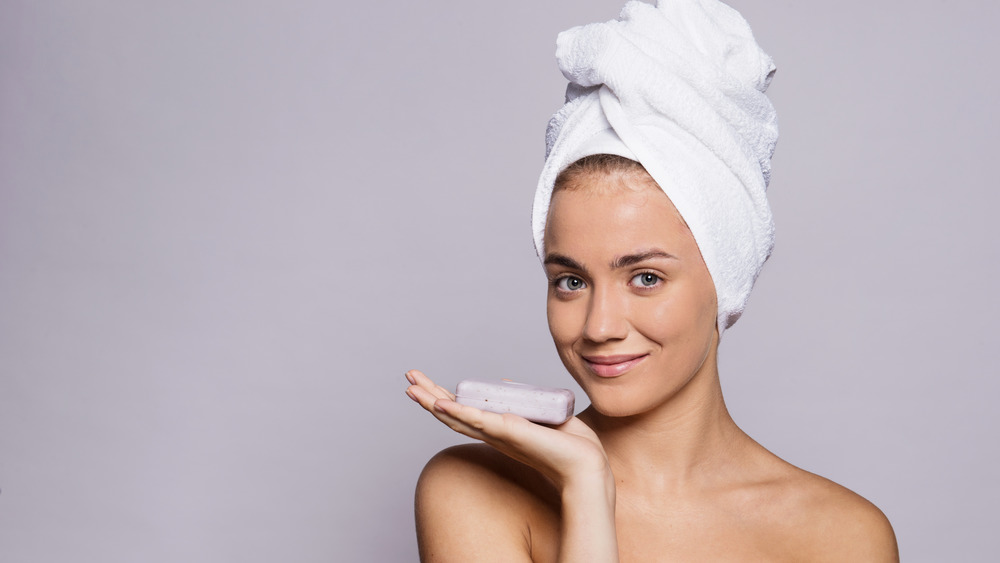Things You Never Realized Were Ruining Your Skin
Wondering why your skin looks sallow, shadowed, saggy, or spotted? It can be completely confounding when you look in the mirror only to see your face looking so, well, dull, dry, or damaged. And, not for nothing, complexion issues affect more than your appearance; they can take a serious toll on your overall confidence, too.
The good (and bad) news is that there are a whole bunch of things that could be ruining your skin. Fortunately, a little research and exercising some processes of elimination can help you figure out what triggers are causing acne, eczema, and other conditions affecting your complexion. Yes, everything from the products you use to what you eat to even what accessories you put on your face can make a difference for your skin. Want to know what exactly is causing your skin woes? Read on learn all the facts and get your glow back.
Products containing alcohol often do more harm than good
If your daily or nightly skincare routine has your face feeling tight and dry, your alcohol-based face wash could be the culprit. Many types of simple alcohols can dehydrate your skin and disrupt the delicate barrier that keeps your complexion looking fresh and radiant. In addition to being overly drying, they may have even worse effect long term. Dr. Maryam Zamani, an oculoplastic surgeon and facial aesthetics doctor, told Byrdie that "they can enlarge pores and increase greasiness."
However, some alcohols are gentler on the skin, and you can limit the amount of harsh alcohols you use. This requires consumers to do their due diligence when browsing ingredients. "The higher the alcohol is on the ingredients list, the higher the concentration and the stronger it will be on the skin," Dr. Zamani explained.
Similarly, while hydrogen peroxide has a rightful place in your medicine cabinet, you'll want to avoid overusing this compound on your face — especially if you're using it help abate inflammatory acne. "It's important to remember that when dealing with acne, your skin is already under fire," cosmetic chemist Victoria Fu told Byrdie. "Potentially adding additional irritation will only make the road to healing more difficult."
Environmental factors are causing your skin damage
"Environmental factors work by creating oxidative damage in the skin, which breaks down collagen and may also serve to damage the barrier function of the skin," dermatologist Jennifer Chwalek explained to Everyday Health. So yes, even stepping foot outside can hurt your complexion.
UV damage is the most obvious environmental source of potential damage. As explained by Harvard Health, ultraviolet rays from the sun can burn and structurally disrupt the skin barrier, leading to a host of complexion woes and serious issues. Blue light is another culprit that can age and damage skin, according to Dr. Chwalek. What's more, the dermatologist told Everyday Health, "Exposure to air pollution, which includes particulate matter, nitrogen dioxide, hydrocarbons, and ozone, creates oxidative damage in the skin that increases inflammation."
While you can't hide indoors all day, you can take some protective measures to mitigate exposure to premature skin agers. As recommended by Everyday Health, wear a mineral sunscreen, find a product with red algae to block more blue light, and up your intake of antioxidants like Vitamin C, which work to "neutralize the free radicals that are prematurely breaking down collagen and elastin," as explained by dermatologist Marisa Garshick.
Your hair products could be helping your hair but ruining your skin
Common ingredients in your favorite hair care products could be drying out your skin. Propylene glycol, an ingredient frequently found in shampoos and conditioners, can cause your scalp, forehead, and neck to feel dry and irritated. It can even cause flaking. Furthermore, it can stay on your scalp and rob your skin of the oils it craves to stay healthy. Thus, as recommended by Byrdie, wash your face and neck after you have used shampoo and conditioner — not before.
On the other hand, many shine-inducing hair serums may contain oil. If that oil gets on your forehead or neck, it can lead to clogged pores and pimples. If you notice whiteheads around your hairline, try swapping out your go-to hair products to see if it makes a difference (via American Academy of Dermatology Association).
Finally, as noted by Woman's Day, boxed hair dye can have harsh ingredients that can harm your skin. And if you use it on your eyebrows to tint them, it can inflame the surrounding skin. Consider swapping out your go-to pharmacy color for a vegetable-based product or tinted brow mascara.
Hot water is harming your complexion
It may feel good to rinse the day away in a steaming hot shower, but sadly, your complexion will pay the price for your decision to turn up the temp. New York City-based dermatologist Shari Marchbein told Allure that hot H20 "strips the skin of sebum, the healthy fats and oils necessary for skin health, and dehydrates the skin." This is especially true for those who already have a skin issue, like eczema, psoriasis, or roseaca. Plus, hot water can exacerbate acne.
Even if you have healthy, moisturized skin, you should avoid blasting your body and face with super hot water — particularly in the cold winter months. ""We are all more prone to itchy, dry skin as the humidity levels drop and the hot water in showers ... draws moisture out of the skin," said Dr. Marchbein. She recommends keeping the water temperature no higher than "lukewarm," or below 110 degrees Fahrenheit.
Sleeping in your makeup is ruining your natural radiance
You fell asleep with your makeup on — no big deal, right? It happens to the best of us, but try to avoid making it a habit. Dermatologist Jennifer David told Well+Good, "Even if you're wearing oil-free makeup, sleeping with your liquid or powder foundation on will clog your pores. This will put you at risk for either causing or worsening acne." It's even worse if you're wearing eyeshadow, mascara, and eyeliner. "Overnight eye makeup can make you prone to irritation, inflammation and even infection," David confirmed. Since your eyelid skin is so thin and delicate, this could easily cause a stye.
So what should you do if you pass out and wake up with a face full of smudges? Dermatologist Ted Lain advised "[removing] the makeup with micellar water, and then gently exfoliate." And maybe consider changing your sheets and pillow cases. As dermatologist Joshua Zeichner told Self, "Every night when you sleep, dirt, and oil are transferred from your skin to your sheets. Especially if you also aren't washing your face regularly before bed, dirt and oil can build up in the fabrics of your pillowcases and sheets over time."
Some chemicals and minerals can wreak havoc on your skin
If you're an avid swimmer, you likely already know that chlorine can take a toll on your skin. Not to panic, a chlorinated pool is not dangerous, and the commonly used chemical is most likely not going to cause you harm. Nevertheless, highly chlorinated water can dry out your skin and leave you feeling irritated, as noted by dermatologist Ana Duarte in Live Science. She suggests swimmers "shower off right after the pool and apply a good moisturizer," as this will help "to replenish some of those natural oils."
More concerning for your epidermis may be the water coming out of your own shower head, though. This is especially true if you live somewhere with hard water containing extra minerals. As dermatologist Tess Mauricio told Real Simple, "Calcium and magnesium in hard water react with fatty acids in your soap and shampoo to form chemicals that coagulate. As a result, your skin doesn't get cleaned properly and the chemicals leave a residue on your skin." This can damage that delicate skin barrier leading to clogged pores, worsened acne, and agitated skin. To combat the damage hard water causes, consider getting a mineral filter for your tap.
Too much coffee and alcohol will leave your skin sallow
Don't put down the coffee cup just yet. There's good news: Java can actually be good for your skin. It's chock full of antioxidants which have loads of health benefits and can reduce inflammation, as noted by Byrdie. So go ahead and have a morning cup or two — just maybe think twice before loading up at all hours of the day, and be mindful of why you're sipping.
A study found that when people consumed coffee right before a stressful event, it caused a more significant increase in cortisol. This hormone surge is frequently associated with acne flareups. What's more, according to Byrdie, flavoring your coffee with sugar and dairy can also negatively affect your skin.
While you're curbing your coffee consumption, you might also consider cutting down on the boozy beverages. Registered dietitian nutritionist Tony Castillo told Byrdie that drinking alcohol can lead to "chronic dry skin." And if you're a regular drinker, watch out. This habit can "accentuate fine lines, broken blood vessels, sun spots, and puffy eyes," dermatologist Brendan Camp told the publication.
Talking on your cell phone and wearing sunglasses can clog your pores
You may not think twice before digging your sunglasses out of your bag and sticking them on your face, but these germ-carriers "can trigger acne since we tend to wear them in warm, humid weather," dermatologist Dendy Engelman told Well+Good. "The combination of occlusion, sweat, dirt, and friction can clog pores, leading to a breakout."
Another germy item: your cell phone. Although it keeps you connected and on the pulse, it can also be contributing to your skin woes. The gross truth is that your mobile is most likely covered in filth. Dermatologist Shereene Idriss explained to Allure, saying, "With each phone call, we reintroduce these germs onto our skin, clogging our pores and leading to eventual breakouts." Thankfully, simply wiping your phone down between uses and employing an ear piece can help you avoid this icky issue.
Blue light emitted from your phone's screen could also be causing damage, potentially fueling dark spots and other problems. Dermatologist Joshua Zeichner told the publication, "There is some data suggesting that visible light, including what comes from your cell phone, may have a negative impact on skin aging. By creating inflammation, visible light may lead to collagen damage and earlier wrinkling."
Excessive salt or sugar may be ruining your skin
Got a sweet tooth? Your affinity for goodies could be messing with your complexion. In Dr. Harold Lancer book, Younger: The Breakthrough Anti-Aging Method for Radiant Skin, the Hollywood dermatologist explains the detrimental effect that sugar can have on the skin (via The Cut). It breaks down collagen thus reducing your skin's natural elasticity. "Sugars bind to the amino acid chains and they gunk up the work," he writes. Furthermore, it increases the production of testosterone, which increases pore size, makes skin greasy, and "turns your beautiful female skin into ruddy football player skin." He continued, writing, "The skin becomes sallow, lackluster and you get those unwanted dark circles."
In excess, salt isn't doing you any favors either. Dermatologist Shirley Chi told ABC 7, "Lots of salt promotes the growth of a bad bacteria called staph aureus which we find in patients who have really bad flare ups of eczema." Additionally, dermatologist Neal B. Schultz told Shape that too much salt can cause you to retain water and lead to undesirable puffiness.
Too much facial waxing is wearing on your skin
Waxing is an easy, quick, and only slightly painful option to help eradicate unwanted facial fuzz or body hair. But, as noted by the Cleveland Clinic, waxing can have some not-so-great side effects. First, hot wax can cause burns if not properly applied and monitored. Next, it can irritate hair follicles leading to ingrown hairs and overall soreness. Finally, you will want to use extra caution before waxing if you regularly use any products with retinol, as this can cause further irritation.
You should also leave your hair removal treatment to the pros, as recommended by waxing expert Noemi Grupenmager: "DIY wax is ... not designed for sensitive skin, and without a trained professional, you risk removing skin with the hair—in some cases even up to two layers of skin," she told Byrdie. Of course, shaving isn't always a better option. If your razor is dull, you could cause even more redness and irritation, per the Cleveland Clinic.
Using too many skincare products is a no-no
When it comes to skincare products, you can have too much of a good thing. You want to be selective in your product picks and curate a targeted skincare arsenal that's not blanketing all the issues. What is more, you need products that work with — not against — each other.
Dermatologist Elizabeth Tanzi told Shape, "Since the ingredients are more active and effective than ever, they can also irritate the skin if overused or used in combinations that are not right for your skin type." She noted that many often will "ignore the irritation" that comes with "using too many products because they falsely think [it's] a sign that the aggressive skin-care regimen is 'working,' when in reality, it is just inflaming the skin."
If your face feels cracked, sore, or inflamed, don't keep going and assume it's going to get better after it gets worse. It may just be a sign that it's going to just keeping getting worse and worse. Furthermore, as dermatologist Arielle Kauver told Shape, you want to add new products into your routine gradually. In case you have a reaction, you'll know what caused the problem.
Heating and air conditioning systems can negatively impact your skin
When the temperature dips, your radiator gets to work — and your skin feels the pressure. Heating systems drain moisture from the air, leaving your skin cracked, flaky, and less than radiant, dermatologist Howard Sobel told Refinery29.
Fortunately, you can easily counteract this situation with a humidifier. It adds water back into your indoor environment and keeps your skin looking and feeling more refreshed. Dr. Sobel also recommends lowering your thermostat at home; layer up and don't rely exclusively on a hot blast of air.
And, by the way, this isn't totally winter's fault. In fact, your complexion is not so safe at home in the summer months when the air conditioner is running on high. Dermatologist Heather Rogers explained to Elite Daily, "Skin has to maintain its water level to look good, but also to heal. If you are cranking the AC when you sleep, you need to coat your skin with a thick moisturizer to protect it from losing water all night long."
DIY chemical peels may be too aggressive for your skin
Going to the dermatologist or spa for a chemical peel or facial can renew your complexion and reveal a glowing layer of skin. Taking matters into your own hands with DIY treatments can sometimes be effective; oftentimes, though, it can result in exacerbating skin issues or creating irritation. This is especially true when trying aggressive ingredients typically used by professionals, like trichloroacetic acid.
While at-home peels have come a long way, they can still be super abrasive. As noted by ABC News, peels work by shedding your outer most layer of skin. For at-home use, beauty consumers should choose those products with a concentration at or under 10 percent of the active ingredient, which may be salicylic or glycolic acid. As there are peels with higher concentrations on the market, you need to be careful.
Dermatologist Mark Abdelmalek explained to ABC News, saying, "Acids work by destroying tissue, and if you put more acid, you're going to destroy more tissue." So leave it on too long, neglect to dilute it properly, or just ignore the instructions and you could end up with a whole lot of hurt — and some seriously inflamed skin.
Regular old soap isn't doing your skin any favors
Traditional soap certainly has its place in your routine. Washing your hands and eradicating germs is of the utmost importance, of course. But using that same bar on your face — and even body — could be doing more harm than good.
As explained by Well+Good, alkaline soap disrupts your skin's natural acidity and throws off that oh-so delicate pH balance. And in this chemical process, it also "cuts oils and can eat away at the natural barrier of the skin if left on too long," said dermatologist Shirley Chi. In other words: If you're soaping up, be sure to rinse it all off. Chi elaborated, saying, "Leaving soap on your skin can cause your skin to develop dryness, and can trigger conditions such as eczema."
Better yet, try a bar soap alternative. As suggested by Healthline, oil cleansing, skin brushing, and handmade soaps are all good options. And for your sensitive face? Dermatologist Joshua Zeichner told Self that you'll want to find a cleanser that suits your skin's particular needs and treats your gorgeous complexion with some TLC.

